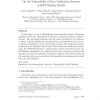Free Online Productivity Tools
i2Speak
i2Symbol
i2OCR
iTex2Img
iWeb2Print
iWeb2Shot
i2Type
iPdf2Split
iPdf2Merge
i2Bopomofo
i2Arabic
i2Style
i2Image
i2PDF
iLatex2Rtf
Sci2ools
168
click to vote
PR
2010
2010
On the vulnerability of face verification systems to hill-climbing attacks
In this paper, we use a hill-climbing attack algorithm based on Bayesian adaption to test the vulnerability of two face recognition systems to indirect attacks. The attacking technique uses the scores provided by the matcher to adapt a global distribution computed from an independent set of users, to the local specificities of the client being attacked. The proposed attack is evaluated on an Eigenface-based and a Parts-based face verification system using the XM2VTS database. Experimental results demonstrate that the hill-climbing algorithm is very efficient and is able to bypass over 85% of the attacked accounts (for both face recognition systems). The security flaws of the analyzed systems are pointed out and possible countermeasures to avoid them are also proposed. Key words: Biometrics, Face Recognition, Security, Vulnerabilities, Hill-Climbing
Related Content
| Added | 20 May 2011 |
| Updated | 20 May 2011 |
| Type | Journal |
| Year | 2010 |
| Where | PR |
| Authors | Javier Galbally, Chris McCool, Julian Fiérrez, Sébastien Marcel, Javier Ortega-Garcia |
Comments (0)

